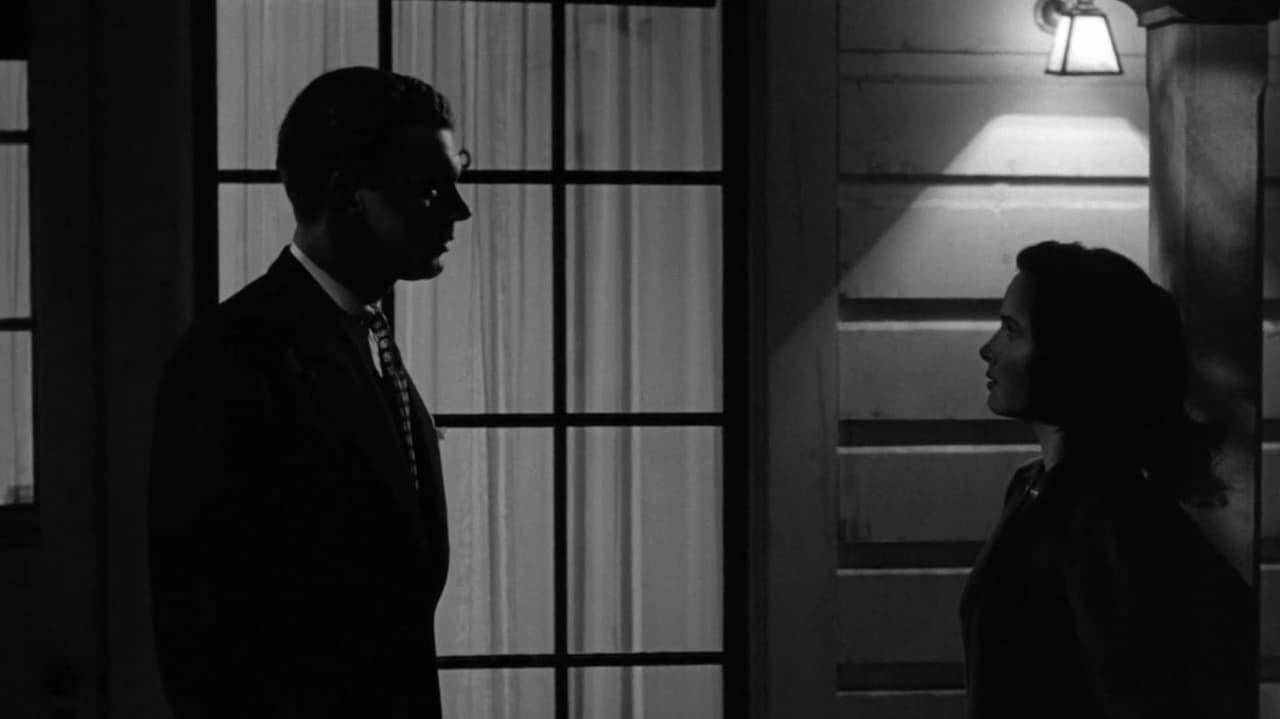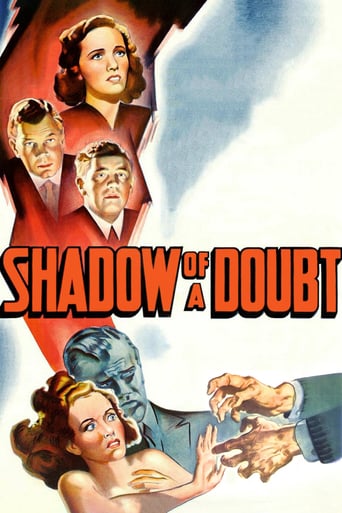

"Shadow of a Doubt" was reputedly Alfred Hitchcock's favorite of his own films, and I guess that really must mean something since he directed more than three dozen of versatile cinematic classics that are all universally considered as brilliant. With all due respect, however, I don't concur with the Master. Even though "Shadow is a Doubt" is an intelligently scripted and highly original thriller, my personal preferences lie with the more visceral horrors that Hitch made, like "Psycho", "Frenzy" and "The Birds". Nevertheless, I like to think it's very significant that Hitchcock names this one as his favorite and, to me, it proves that he also has a predilection for horror and sadism. Rather than choosing for his uptight thrillers ("Read Window", "Vertigo" ...) or his convoluted conspiracy thrillers ("North by Northwest", "The Man Who Knew Too Much" ...), he prefers the dark little tale of a cold-hearted psychopath arriving in a sleepy small town and turning the lives of his unsuspecting family members upside down. Our visionary director clearly finds tremendous joy in unleashing pure evil, in the shape of charming and wealthy self-made man "Uncle" Charlie Oakley, upon the peaceful community of Santa Rosa, California. But even more remarkable is that the naïve and picturesque community, and particularly Charlie's beloved adolescent niece (also named Charlie after her uncle), is subconsciously craving for and warmly welcoming the embodiment of evil! Young Charlie is desperate for some excitement in her mundane life, so imagine the confusion when she slowly realizes that her "special-bond" uncle is the notorious Merry Widow Murderer and the subject of a nationwide police manhunt. It's praiseworthy how Alfred Hitchcock delivers a tense and atmospheric thriller in which the fearsome serial killer isn't even seen committing any of the vile crimes he's wanted for! Young Charlie puts the pieces of the mysterious puzzle together herself, with the help of her love-interest police inspector, and meanwhile Uncle Charlie becomes less lovable and more menacing. I've rarely seen a director playing with the emotions of his lead characters so efficiently, while both Theresa Wright and the genius Joseph Cotton make the most out of their unusual roles. The eye of detail in the script and in Hitchcock's direction is fantastic! For example: as a sort of running game, young Charlie's father and a befriended neighbor (Hume Cronyn) are always debating original and vicious methods for murdering each other, even though they are both normal and slightly dull family men. It's further proof of how the whole of Santa Rosa is unwillingly embracing the coming of evil. I'm changing my mind, in fact... "Shadow of a Doubt" must be listed in my top five favorite Hitchcock films!
... View More"Shadow of a Doubt" was the first truly American film by Alfred Hitchcock. His previous films in Hollywood had strong overtones of being in a British setting but that all changed after 1943 with the release of "Shadow of a Doubt." A psychopathic killer who is wanted in connection with a series of brutal killings, flees his home city and travels many miles to a small town where his relatives live. He attempts to conceal his real demeanour with that of being "the charming and easygoing long lost uncle." He maintains this facade until his niece (Teresa Wright) suspects her uncle is not quite what he claims to be. There soon develops a game of cat and mouse between uncle and niece as her suspicions lead to her distancing herself from him and his smokescreen gradually evaporating as a result. The scene where Wright looks up some old newspaper articles at the local library, is a major development in her discovering what her uncle really is. Joseph Cotton was usually cast as the decent and ordinary everyday kind of character. When I first discovered he played a killer in a Hitchcock movie, I had slight reservations as to his suitability and credibility. Boy was I wrong! The actor makes for a creepy and sinister murderer who shows no remorse for what he has done. Hitchcock got precisely the right of performance from Joseph Cotton, there is nothing theatrical or superficial about it. Teresa Wright does a good job in projecting both vulnerability and determination. It is quite disturbing how the rest of the family are completely unaware of what is happening during the film. To them, Cotton is just a kind and ordinary person, like the sort of person you pass in the street. Hitchcock's creative juices were in full flow in "Shadow of a Doubt."
... View MoreUncle Charlie is a killer on the loose, who stays with his sister's family in a peaceful suburban home in an attempt to hide from police. Mystery and intrigue is maintained throughout as we question whether Uncle Charlie is a suspect, while the latter half creates suspense by putting Niece Charlie in danger, as she begins to uncover the truth. The film is masterfully shot - so well in fact, that it seems to have blinded audiences to the plot holes.First, one of the early clues involves the Uncle ripping out a newspaper article regarding the murderers deeds. But he had no need to do that, as the article never tied him to the murders in any way. In fact, only by ripping it out did it become a clue that could be used against him - a cheap narrative tool.Second, Uncle gives Niece a ring with the initials of a deceased engraved on it. This is a guy who has $40k to open a bank account with, do you think he would risk passing on evidence like that instead of simply buying a new ring? Of course not. Third, when the only other suspect in the case is killed, he is labelled the guilty party and case closed. This makes no sense whatsoever. If he was guilty, then Uncle would be innocent. If he wasn't guilty, then Uncle would still be under investigation. There are only two logical paths here and the film takes neither.Fourth, the film keeps hinting at some "special" connection between the two Charlies - they share the same names, and an early coincidence makes Niece wonder if they are telepathic. But this connection runs exactly nowhere and one wonders why it was ever introduced. (The romantic subplot between Niece and Detective is also irrelevant, except to try and provide a happy ending).With all this "doubt" about, it would have at least been nice to have a twist ending (hell, I'm sure they could have made the family friend Herbert the real killer - they could have at least set up a few more suspects!), but alas, it will not surprise you in any way.An interesting aside are the quirky conversations the father and Herbert have about how to execute 'the perfect murder'. In a career dedicated to the idea, Hitch must have had many of these conversations himself, and we see a few fruits of those conversations towards the end of the film. Instead of saving the best til last however, the climax on the train was the least creative of all. The user Jason in these comments said it perfectly, "A good ending involving a villain failing is supposed to happen because of the villain's Achilles's heel. Not a Deus ex Machina!"Although 'Shadow of a Doubt' is not his original story, I'm disappointed to learn Thornton Wilder was one three screenwriters, for his novel 'The Bridge of San Luis Rey' is excellent.
... View MoreAn average family in Santa Rosa, California, being encroached by a man of vice in this intriguing Hitchcock thriller, a young teenager Charlotte Newton (Wright), aka. Charlie, grumbles about her family's stuck-in-inertia status quo: her father Joseph (Travers) is an ordinary bank clerk, who is only fond of prattling about morbid murder strategy with their neighbor Herbie (Cronyn in his film debut); her mother Emma (Collinge), a tireless housewife who has three children to attend to, Charlie, Ann (Wonacott, a bespectacled bookish kid) and Roger (Bates), the youngest boy.So Charlie is expectant a miracle to happen, to at least bring some excitement, that's when her namesake uncle Charlie (Cotten) from her mother side, announces his visit from New York, where the picture's noir-ish prelude ominously manifests that uncle Charlie is on the run from some unspecified party. Though Charlie claims her intrinsic affinity towards her uncle, gets all hyped-up by an improbable telepathy between them (well, it is just a sheer coincidence), to viewers, her desperation of seizing anything can break the ennui patently overwhelms their real emotional bond. However the plot doesn't pad out their past stories since the narrative steers directly to that suspicion-arousing development right after the first family dinner after uncle Charlie's arrival, his gift to niece Charlie is a ring engraved with other person's initials, a way-too-obvious act of hiding a newspaper article doesn't make much sense in the first place, but the tension has been aptly built, so we are all absorbed to see how young Charlie will step by step edge near the dark secret, which will entirely shatter the shallow idolatry for her worldly uncle and perniciously subject her to consecutive murderous attempts.That is a typical Hitchcockian premise, the fuse is ignited, let's all wait for the explosion with bated breath. But what jars this is the unfortunately outdated persona of our heroine (it is made in 1943, time changes, so is the ethos), young Charlie is an innocuous gal, safely protected from the adult seediness penetrating the society by provinciality and her "average" upbringing, which indeed ricochet to dampen her spirit. During her rude awakening, Charlie is never proactive to be gauged as smart, or intrepid enough to match her rival, the only reason she can narrowly survive all the deathtraps is just because she cannot die, she is the protagonist, a symbol of innocence and purity, which prompts Hitchcock to really jump the shark in the rash ending to dispatch the villain. Throughout the whole process, Charlie hardly does anything effectively admirable, hobbled by her own sentimentality, she has the key evidence in her hand, but it never occurs to her that a sensible act is to give it to the detective Jack Graham (Carey), who is unmistakably besotted with her, even when she is completely convinced that uncle Charlie is a wrongdoer at large.Nevertheless, viewers can tell, Hitchcock is more resolute in pinpointing uncle Charlie's sociopathic reckoning, especially his misogynous rant during the dinner, which is plain execrable, what makes him a more deserving recipient of the fortune than those rich widows? It certainly hurts when no one dares to refute back, it is a missed opportunity for Charlie to speak volumes for herself, pitifully it is not in Hitchcock and co's minds. Moreover, a big chunk of the information about uncle Charlie's crime has been decidedly undisclosed, what is the deal with another suspect? And since the detectives have a picture of uncle Charlie, what happens to the assuming witness who could identify the perpetrator? These blank bullets leave the film a bit less compact as a top-tier Hitchcock production, albeit the sporadically scintillating lustre (magnificent chiaroscuro galore) manufactured by the technique department.
... View More